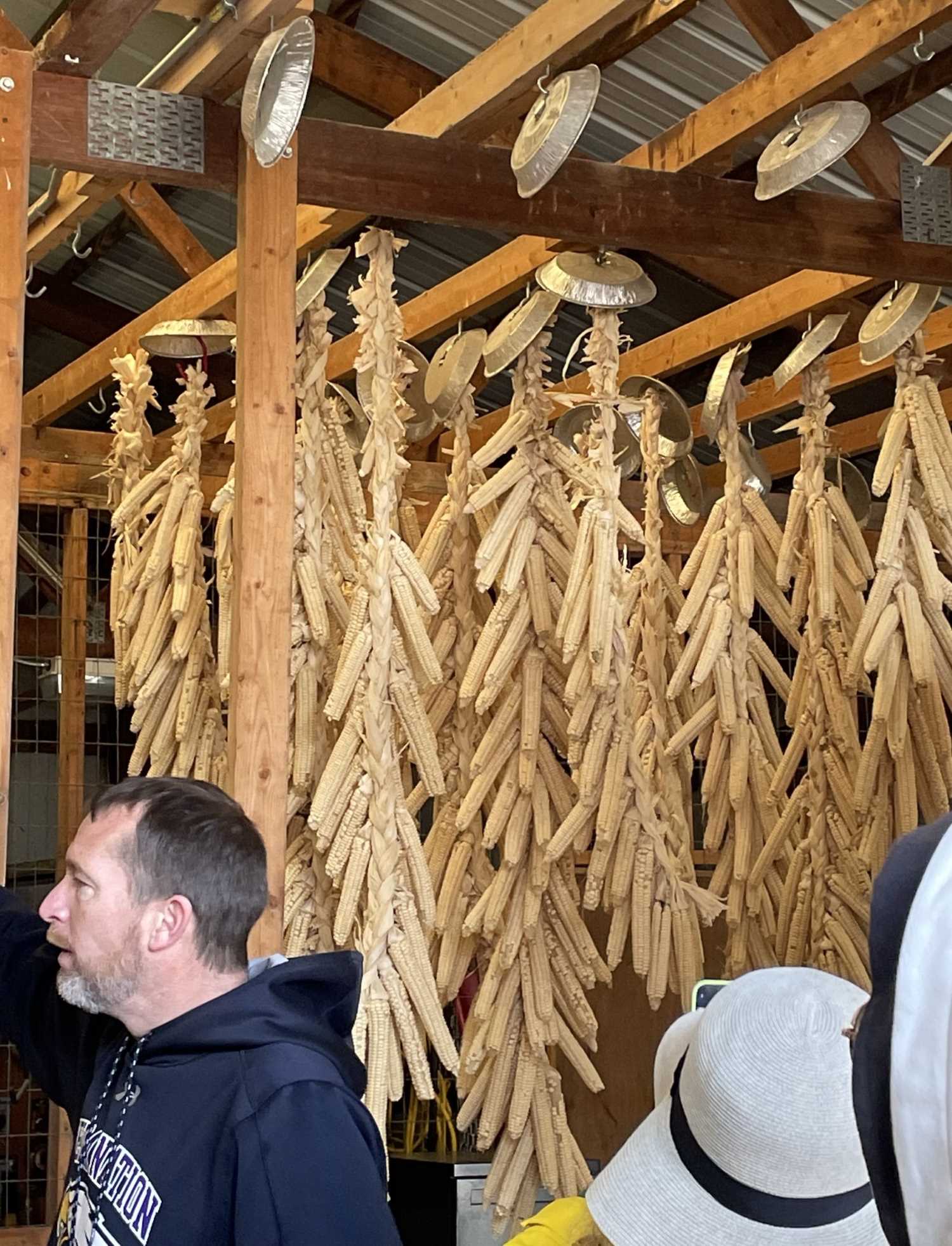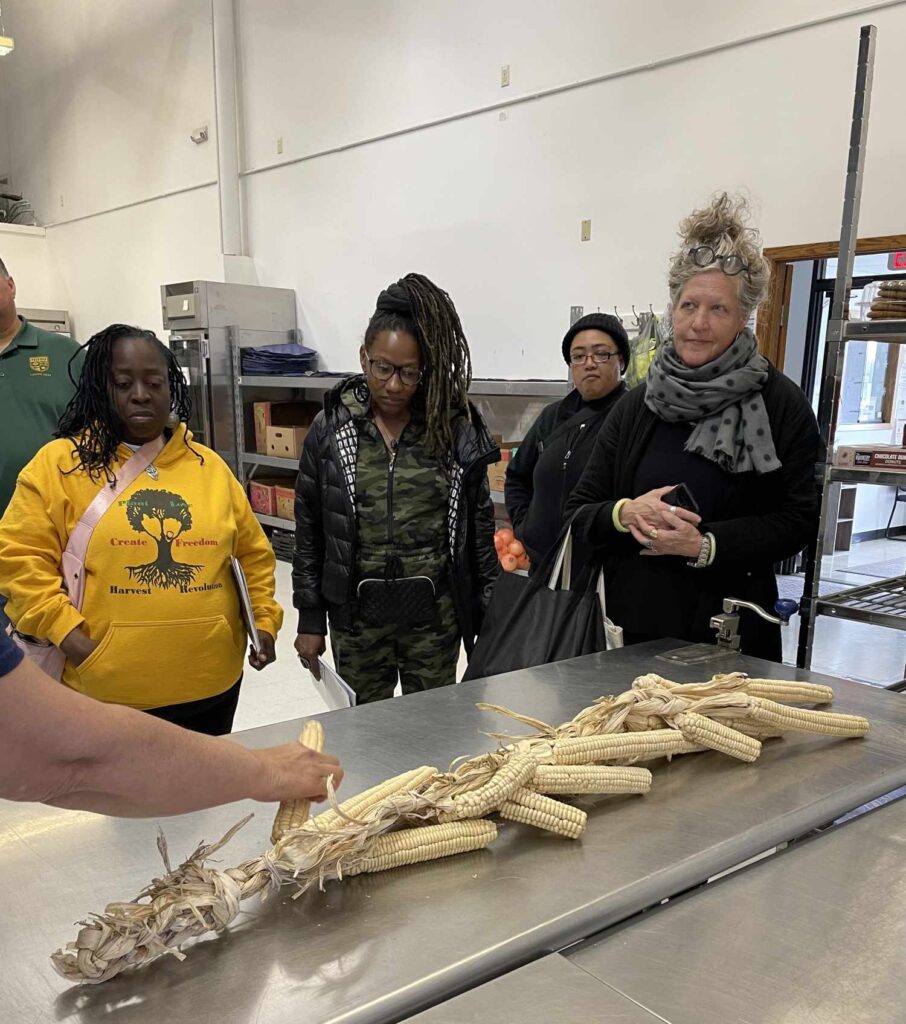
Eric Freeman and Gratia Lee, Kent County Food Policy Council members, reflect on a trip to visit the Oneida Nation to learn more about their food sovereignty culture and work
Reflection By Eric Freeman, Council Member and Founder of Mindset Meals & Flavorful Futures
Recently, we went on a transformative journey to Green Bay, led by WhyHunger, Eleanor, and Shane, to engage with the Oneida Nation. This experience delved deep into their community, schools, farms, and food initiatives, fostering profound learning and personal growth.
The trip fostered a connection to the earth and a community deeply rooted in nourishment. From exploring farms to experiencing the vibrant food culture, I was reminded of the intrinsic connection between people and the elements of substance.
Workshops on the second day provided a space for healing from personal trauma. Through these sessions, I felt grounded, belonged, and connected to a profound source. The experience served as a catalyst for personal growth and resilience.
By infusing the principles of collaboration and community-centric approaches gleaned from the Oneida Nation, I envision significant strides in food policy work in Kent County and beyond. Through inclusive decision-making processes and partnerships with local communities, we can co-create policies addressing systemic food insecurity and inequity issues. Moreover, drawing upon the learnings from diverse food justice sectors across the nation, we can amplify our efforts and advocate for transformative policies that prioritize the right to nutritious food for all. As we forge ahead, grounded in collaboration and solidarity
The journey to Green Bay was not just a trip; it was a profound exploration of community, healing, and growth. As I continue my work in food justice and sovereignty, I carry the invaluable lessons learned from the Oneida Nation and the commitment to embody collaborative principles in my leadership journey.

Reflection by Gratia Lee, Council Member, Director of Good Food Systems, Access of West Michigan
Our recent trip to Oneida Nation in Green Bay, Wisconsin for the Midwest Gathering left me feeling hopeful and inspired. During our many tours of different farms and food sites on the reservation, we had the privilege of seeing a place that is truly working toward food sovereignty. We were able to visit their Oneida Nation Apple Orchard where they are switching to regenerative practices and moving away from chemical use.
A highlight on that stop was the over 100 chickens in a portable chicken coop, who are used to move along under the apple trees to eat pests. One of my favorite stops of the day was Tsyunhehkwa Farm, a 100% organic farm where grass-fed beef is raised and traditional Oneida white corn is grown. This type of corn is unique, in that it has zero sugars and is high in protein, it also contains a slow-releasing carbohydrate that is known to help prevent and regulate diabetes. The corn can only be picked when it is dried and then it is carefully braided for storage. The harvest is a big community event.
The Oneida Cannery was another impressive place, where the corn and apples are processed for distribution within the community. It is a food production processing, preservation and educational facility that has been in operation since the 1970’s. It was amazing to learn how much corn in processed there, and how all of it stays within the community. We also got to see the tribe’s bison herd, which was started in 1996 and now has over 150 animals. They process the meat for consumption on the reservation, as it is a leaner meat and better for the community’s health. On each stop of our tour, it was so evident what a community-based place they are, and how they work are working together to create a thriving community. Each person we met was so welcoming and eager to share about their work.
One thing we discussed as a group was that there is nothing fast about this work, reconnecting to ourselves, to our land, to nature, it is slow work. We talked about how often we as humans have this sense of separation but we are not separate, and being in an Indigenous community reminds one that everything is deeply connected. To bring this work back to Kent County, I want to find ways for us to connect more intentionally with our Indigenous neighbors upon whose land we reside, and to find ways to collaborate and work together on issues of food justice and food sovereignty right here in our community.